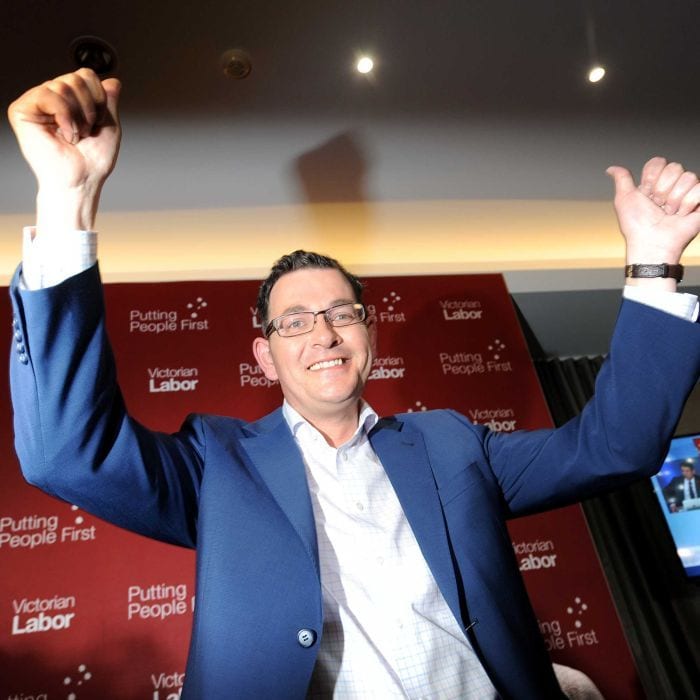
Australia urgently needs leadership on climate change. After 100 days of the Andrews State government in Victoria the signs are promising that this is a government that understands the problem and is committed to filling the climate leadership void in Australia. Could the Andrews government be the leader that we need on climate change?
There are three processes currently underway that give cause for optimism.
Firstly Environment and Climate Change Minister Lisa Neville is conducting a review of the state’s Climate Change Act with a view to reintroducing a state emissions reduction target. This will be a root and branch review of the case for action on both mitigation and adaptation, what sort of targets the state should adopt, and the policy instruments that State governments have at their disposal.
Promising also is the government’s intention to collaborate with other states such as South Australia and New South Wales. With the Federal government missing in action a combination of states could fill that leadership vacuum by developing more ambitious renewable energy or decarbonisation targets that would cover most of Australia’s population and Australia’s largest electricity market.
Also encouraging is a clear signal that the Victorian government is prepared to make the case for action on climate change- an element that has been so often missing from past attempts in Australia. This requires a cultural change in the way the government develops and makes the case for policy. Recent comments by Minister Neville demonstrate that she is well aware that the machinery of government needs a very clear mandate to build public support for climate action, telling a recent conference:
“One of my first actions as Minister was to visit our climate change team in the department to tell them that they were allowed to start talking about it again and could stop using the phrase ‘climate variability’ and call it what it is – climate change.”
The second and third processes that give cause for optimism are the development of Victorian energy efficiency and renewable energy strategies under the leadership of Energy Minister Lily D’Ambrosio.
On energy efficiency the Minister held a roundtable last week and outlined her intention to make Victoria a leader in energy efficiency. This year the government will develop an energy efficiency and productivity policy agenda with the aims of reducing emissions, creating jobs and cutting bills for households and business. In Australia energy efficiency has often been viewed as messy, complicated and ‘unsexy’ by policymakers. There seems to be a much more sophisticated understanding from the new Victorian government that energy efficiency offers the lowest cost means of decarbonising our economy while creating thousands of jobs.
On renewable energy again there is an appetite to ensure that Victoria achieves its share of national investment under the renewable energy target; that the national renewable energy target is not weakened by the Federal government; and to develop state policy that attracts investment in new renewable energy projects in Victoria. A renewable energy action plan will be developed this year and released ahead of international climate negotiations in Paris.
Of course for all three of these processes the proof of the pudding will be in the eating. Victoria has some large challenges to decarbonise its economy, not least the fact that we have the dirtiest power stations in the nation. Currently there are no policy instruments on the table that will facilitate the retirement of our oldest power stations like Hazelwood and Anglesea who now pollute freely (and unnecessarily given the oversupplied electricity market) in the absence of a price on carbon.
The government will also have its knockers who will discourage them from taking any leadership action arguing that State governments acting in the space creates a confusing landscape for national businesses who have to comply with different arrangements from state to state. These blockers should be ignored- by and large they are the same businesses and lobby groups who sat silently by while a national carbon price was dismantled, and in some cases they were instrumental to its repeal. They made the national climate policy landscape messy and now have some chickens coming home to roost.
The Government will also need to cobble the numbers together in the Parliament to get legislation through the Upper House. Here the Greens with their largest contingent ever will be important, and they have also been proactively working with industry to develop their own renewable energy and climate change agenda. But there will also be challenges on the cross-benches with Upper House representatives with unknown views on climate change.
How the Victorian Coalition responds to climate legislation in the Parliament will be instructive. The Baillieu and Napthine Government’s waged ideological warfare on climate programs and our exit polling in key marginal seats found it hurt them at the ballot box. Some Coalition voices like Robert Doyle and Clem Newton-Brown have been arguing publicly that the Coalition needs a credible environment policy to remain electable. It is unclear whether these voices of reason are being heard. The new Opposition Leader Matthew Guy’s failure to appoint a Shadow Minister for Climate Change might suggest that their preferred approach is to continue to act as though climate change is not happening.
Australia is now in a similar position to the US where national leadership has been lacking on climate change but states have worked both together and alone to fast track clean energy investment and emissions reduction. It is not the ideal scenario but it’s the best possibility we have in the short to medium term with Federal government intransigence and neglect on the issue.
For much of the past few years it felt as though the tide was going out on climate change action, at least as far as government leadership was concerned. Over the same period the science has been telling us with ever greater urgency that we are breaching the physical limits of the planet’s ability to cope with our emissions and that we urgently need to decarbonise our economies before we enter a cycle of uncontrollable and catastrophic climate change.
With the election of new governments with a different approach in Victoria and Queensland, and with the Federal government’s shrill attacks on the carbon tax now looking a little ‘last century’ the tide may well be coming in again.
With Victorian strategies on climate change, renewable energy and energy efficiency all to be released by the Andrews Government in the lead up to international climate negotiations in Paris there is a real chance that the Abbott government will look increasingly isolated and out of its depth both nationally and internationally. With up to 6 Victorian seats at play in next year’s Federal election, the politics of state leadership on climate change in Australia’s most progressive state start to look as compelling as the science.
Mark Wakeham is CEO of Environment Victoria.










